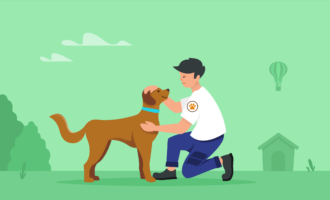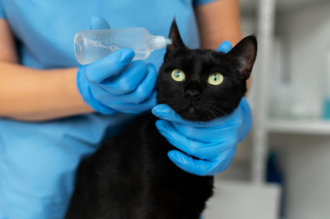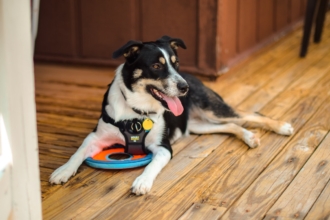Top adoption form questions
- What’s your contact information
- What size animal do you want to adopt
- What are a few breeds you’d like to adopt
- What’s your living situation
- Are there any specific characteristics that you’re looking for in an animal
- Are you comfortable handling a pet that may potentially be destructive or aggressive
- Have you checked with your landlord
- How much are you willing to spend on adoption fees and supplies
- Can you afford to pay for any needed vet care if your new pet gets sick
- What other animals do you have at home
- How much time are you willing to spend exercising with your new pet
- If all else fails, are you prepared to deal with the emotional stress of returning a pet
Animals feel love. Dogs will stare at you with big watery eyes for hours. Cats always want to be with you, in your lap, on your keyboard, perched on the back of your chair. Well, some cats do anyway.
These thinking, feeling creatures deserve only the best from the humans who’ve domesticated them. As a person who works at an animal shelter, you’ve been on the front lines. You’ve seen the best and the worst in people.
So naturally, you want to do everything you can to make sure that every animal goes to the best home possible. One way to achieve that goal is to develop a thorough adoption application. Check out this list of adoption form questions you should include and what makes them important:
- What’s your contact information? This one is pretty obvious, but it’s still necessary. Answers should include name, address, telephone number, and email address.
- What size animal do you want to adopt (large, small, etc.)? Some people love big dogs and want something like a Lab or a Newfoundland, but it’s important to educate them on how much more difficult a big dog is to care for than a small dog. Wiping the feet of a muddy Chihuahua takes a minute, but cleaning up a golden retriever after a walk on a rainy day could take 20 minutes or longer.
- What are a few breeds you’d like to adopt (Labrador retriever, Siamese cat, etc.)?
It’s great when people go to a shelter for a new pet instead of visiting a pet store. But some people will have unreasonable expectations about what they’re likely to find at a shelter. It’s a good idea to set reasonable expectations early on. A person might want to walk out with a Kurilian Bobtail, but it won’t love them any more than a tabby. - What’s your living situation? (Do you have a yard, live in an apartment, etc.?)
This can help ensure no one in a third-floor studio apartment adopts a dog that needs a lot of exercise. - Are there any specific characteristics that you’re looking for in an animal (friendly disposition, hypoallergenic coat, low shedding coat)? Once again, a shelter isn’t the place to order up your ideal pet. Every animal needs a loving home, but someone with less experience training an animal shouldn’t be expected to work with a fearful dog that guards food. This question can help you set expectations, but don’t forget to be understanding.
- Are you comfortable handling a pet that may potentially be destructive or aggressive due to a lack of socialization or training? This relates to the last question. Make sure that an adopter is well suited to the animal’s disposition. On top of that, make sure that they’re not looking for an aggressive dog to chain up in the backyard for security.
- Have you checked with your landlord (if you’re a renter) to see if there are any restrictions on pet ownership and/or weight limits for animals allowed in the residence? This gives you the opportunity to tell potential adopters that landlords often charge a deposit and sometimes even pet rent as well.
- How much are you willing to spend on adoption fees and supplies, such as food, toys, and a carrier or crate for transport? As you know, the costs to walk out of the adoption center are only the beginning. Potential new pet owners need to know that adopting an animal is a long-time financial commitment.
- Can you afford to pay for any needed vet care if your new pet gets sick or injured? This is similar to the last question. Vet bills can become astronomical, especially if you don’t have pet insurance. Pet owners need to know that accidents can happen at any time, so they have to be ready for them.
- What other animals do you have at home?
Despite all the cute videos on TikTok, cats and dogs don’t always get along well with each other. Heck, some dogs don’t even get on well with other dogs. That’s doubly true for cats. It’s a good idea to schedule a few meetings to make sure everyone gets along. - How much time are you willing to spend exercising and playing with your new pet each day/week/month?
If a pet owner isn’t willing to exercise their pet at least once a day, they really have no business caring for an animal. Three or four times a day might be more appropriate for dogs because they’re such social creatures. - If all else fails, are you prepared to deal with the emotional stress of returning a pet to the shelter after a short period of time? No matter how careful you are or how well informed the adopter is, animals are unpredictable. Sometimes things come up, and the animal may need to be returned. It’s better in the long run if this happens before anybody gets too attached.
The way to make the adoption process a little easier
Those are some pretty challenging questions for people to answer. The process can be quite stressful as a result. You can make it a little easier on them, though.
If you use a digital form, potential pet adopters can fill it out in the comfort of their home and come in when they’re ready. That’s especially helpful in situations where they need extra documentation like their lease agreement or training certifications.
The best form builder to use for adoptions is Jotform, hands (and paws) down. Creating a form in minutes is easy for anybody. We even offer several templates to help you get started.
Photo by Daria Shatova on Unsplash










Send Comment: